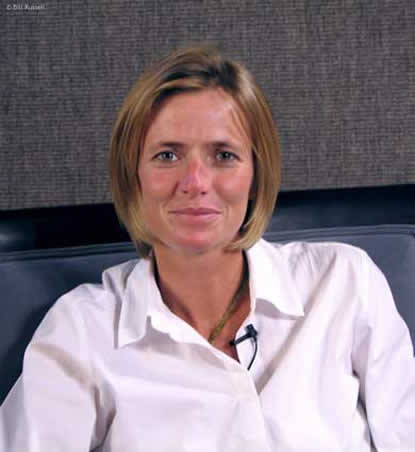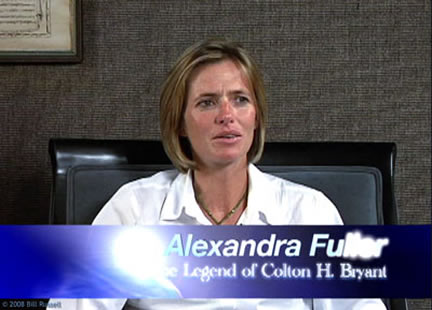 |
Alexandra Fuller... writer. Winner of the international Ulysses Award for literary reportage in 2005, Ms. Fuller’s The Legend of Colton H. Bryant is a devastating critique of the gas and oil industry’s predation in Wyoming, where she lives. She was born in the U.K., grew up in Africa in the midst of Rhodesia/Zimbabwe’s civil war, then in Malawi and Zambia, depicted in best-seller Don’t Let’s Go to the Dogs Tonight and Scribbling the Cat. In addition to writing acclaimed books, Ms. Fuller is published widely in newspapers and periodicals including The New Yorker, Vanity Fair, The New York Times and National Geographic.
|
America’s addiction to energy is translating into a compulsive takeover and destruction of our land and people, Alexandra Fuller reports from Wyoming. A master of literary reportage, Ms. Fuller grapples with these threats in The Legend of Colton H. Bryant.
“My job is making connections. I spent many many hours out on that Wyoming oil patch putting dots together. Climate change. Energy. The lies we tell ourselves so that we can just keep consuming. It all came together for me in this kind of apocalyptic way. The ADHD of our culture. The way energy has allowed us to go after everything with such thoughtless speed. The war (in Iraq and Afghanistan). The war on ourselves. The war on our environment. The desperation that I felt.
“And then into my desperation walked Colton H. Bryant with those startling blue eyes and a heart the size of all of Wyoming and mustang taming ways and an extraordinary thing happened. I fell in love with a dead roughneck. With his family, with his children, with this exuberance he had for life. With the way that he embraced Wyoming, with this passion for land, with the way that he understood land, with the way that he understood that he was going to leave the world with the same unseemly haste with which he came into it. I came from all this fear and judgment and my liberal high horse and I got onto this lowly donkey of love.
“Why is it that we're prepared to sacrifice everything -- and I don't just mean we the oil companies, I mean we the people -- why are we the people prepared to sacrifice everything for ‘now’? Why is there no tomorrow?”
There’s been drilling in Wyoming for decades, why is this boom different?
“Because of the urgency to get the minerals out of the ground while the price is so good, while the Administration is so friendly, while the demand is escalating as temperatures soar in California and people are using natural gas to cool themselves down. Someone swanks in with shiny cowboy boots and he's got the language, he's clearing his brush on his Texas ranch and other very calculated acts, and says, ‘If you don't drill here, some boy is going to have to go and get shot at in Iraq’ -- that is the explicit threat I’ve heard -- you buy the lie and you pay for it with your life.”
Ms. Fuller’s convinced recovery requires getting past fear.
“Fear stops the acts of imagination and initiative. We have alternatives. Somebody called Wyoming "the Saudi Arabia of wind." Americans need to conserve their use of fuel. Why not put solar panels on every single roof in Miami or Las Vegas? Have more OSHA offices so the rigs are looked at before drilling starts, not after there's an accident. In the meantime, slow down the drilling to the point it can be done safely. Get these boys safely to their children at the end of the shift.
“We have caused incredible violence and heartbreak in the midst of this addiction. I don't think I've ever met a recovering addict who didn't say it was the toughest thing they've ever done, required the hardest hardest work to forgive whatever forces you were blaming. We’ve hurt the planet and each other in ways that are really unforgivable. But unless we forgive ourselves, solutions are going to be hard to find.”
[This Program was recorded May 22, 2008, in Atlanta, Georgia, US.]










